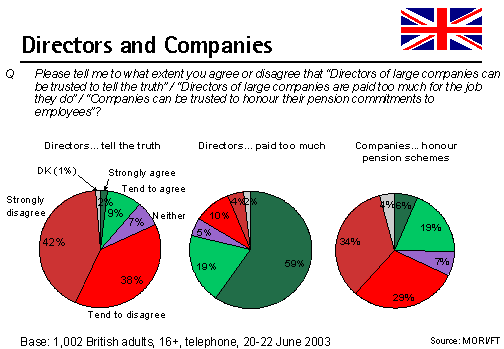Trust In Business
Eight people in ten disagree that "Directors of large companies can be trusted to tell the truth", according to the MORI poll conducted for the Financial Times last week.
And nearly two thirds of those in full-time employment, 65 per cent, say they do not believe that "companies can be trusted to honour their pension commitments to employees". Nearly one worker in four no longer believes that company pension schemes are worth joining.
These finding strike at the heart of corporate Britain, and are a measure of the scepticism, even cynicism, of the British public towards the leaders of British business today.

Further, more than three quarters of the public believe that "directors of large companies are paid too much for the job they do". This is in spite of the fact that among those actually in employment, over three quarters, 77 per cent, say that they'd say that their workplace is very or fairly well run, contrasting with the just over half the public, 55 per cent, who think the country is well run.
Over some twenty years MORI has measured the confidence people have in various professions' and occupations' veracity, asking whether they felt that doctors, teachers, journalists and other groups can be trusted to tell the truth. Earlier this year a 'veracity test' (carried out in February for the BMA) found that only a quarter of people, 28 percent, said they trusted business leaders to tell the truth, about on the average score over the past 20 years, which peaked at 32 percent in 1993, and was as low as 25 per cent in 1983 and again at 25 per cent last year.
In this year's survey, business leaders, (trusted by 28%) ranked below trade union officials (33%), and just above government ministers (20%). This should be worrying to the CBI.
It should also be worrying the CBI that a MORI poll carried out between March and May among young people between 13 and 18 as part of the Nestlй Family Monitor found only 16 per cent of young people who said business leaders could be trusted to tell the truth, ranking even lower than government ministers.
And in the survey for the FT, among the next older, 16-34, age group, those in the job market for their first paid employment, or possibly thinking about changing jobs, three in four, 76 per cent, say that they don't believe directors of large companies can be trusted to tell the truth. Even more of those in full-time employment, 84 per cent, are sceptical they can believe what the big bosses tell them.
Trust goes hand in hand with standards in both public and corporate life. When people don't think they can trust companies to tell the truth, they are suspicious, and ask for government regulation to protect consumers from being ripped off, from risk from faulty products, from breaches of faith in employment protection, for protection against pension defaults.
There was a time when the senior partner of the law firm, the grey beards in the City, in business and even in politics when confronted with dodgy practice would say 'not done'; more recently, in seems they would say 'how much?'
Increasingly, peer regulation has given way to public pressure for legislation and regulation by government appointed watchdogs. Business complains about this intrusion, but consumer groups, the media and the trade unions all demand action to protect their clients against corporate malfeasance.
Technical details
MORI interviewed 1,002 British adults 16+ by telephone nation-wide on 20-22 June 2003. Data are weighted to match the profile of the British adult population.
Sir Robert Worcester is Chairman of MORI



